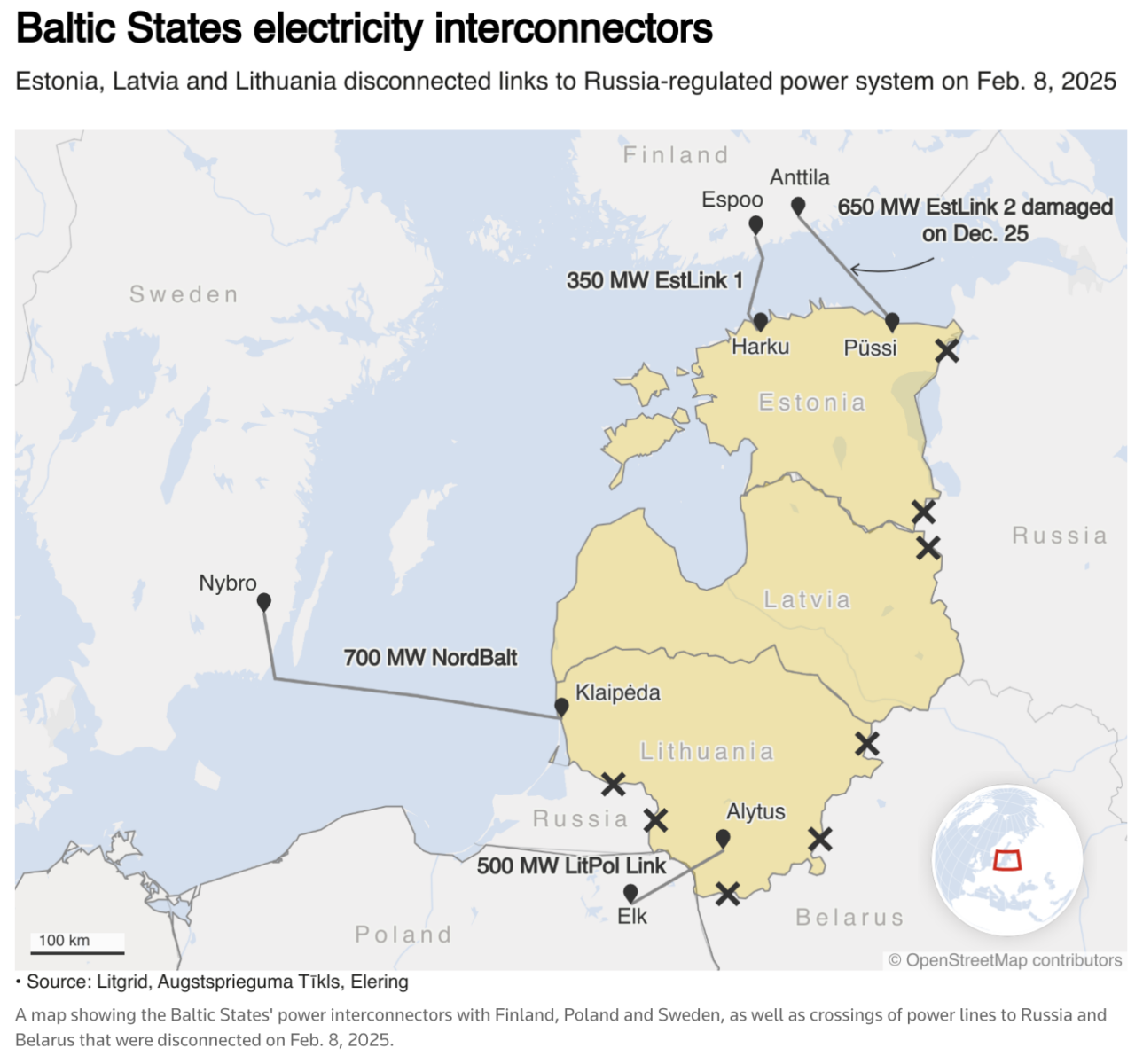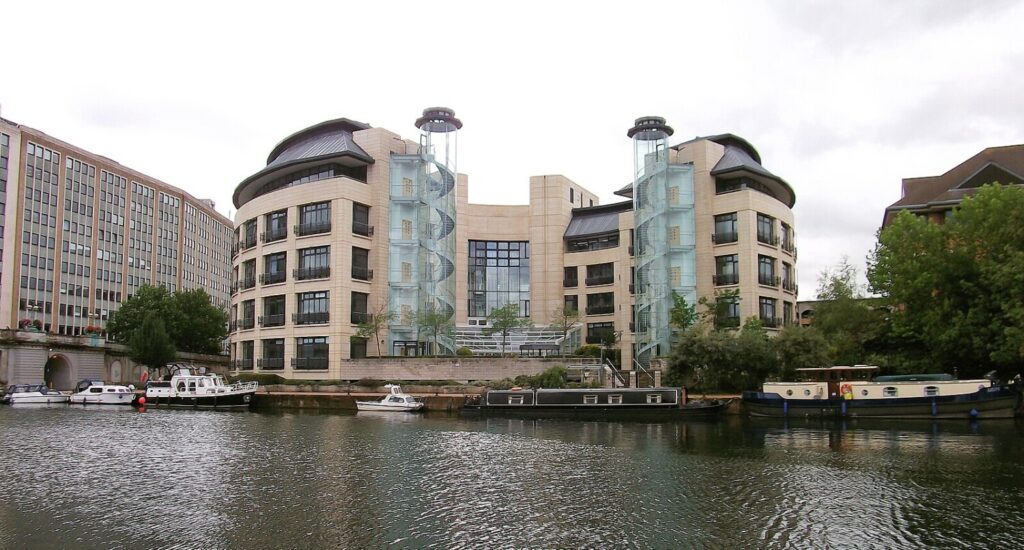Baltic States’ Effort to Reduce Electricity Risks Could Prompt a Russian Response, Increasing Economic and Energy Threats
On February 9th, 2025, at 2:05 PM, the Baltic states—Estonia, Latvia, and Lithuania—successfully connected their electricity grid to the Continental Europe Synchronous Area, one of the world’s largest synchronised power grids. This achievement marks the completion of a long-running effort, initiated in 2007, to separate from the Russian and Belarusian grids. The completion of the project marks a significant step toward energy security and European integration, while also symbolically distancing the states from Russia and their Soviet past. In practicality, none of the three states have bought Russian or Belarusian electricity since the early part of Russia’s 2022 aggression in Ukraine (Rooks, 2025), but it does attempt to close the door on Russian blackmail or interference, as the infrastructure remained tied to Moscow.
An Opportunity For Russian Aggression
This symbolic action is likely to provoke significant Russian discontent and further exacerbate tensions between the post-Soviet states, which are already characterised by mistrust and instability. Unclaimed and easily-denied Russian attacks on critical European energy infrastructure in the Baltic Sea have been carried out through their “shadow fleet.” This term refers to the mostly non-military vessels involved in sabotage, whether accidental or intentional. Since 2021, these attacks have increased, using inexpensive and subtle methods, such as dragging anchors (Gricius 2025). These actions pose a significant threat of disruption and lead to costly repairs for the affected states (Cooban, 2025; Deutsche Welle, 2024).
Given the continued aggression allowed in part by the plausible deniability of the sea-borne attacks in the Baltic region, it is likely that Russia will pursue a concerted effort to disrupt energy infrastructure within its immediate sphere of influence. This has an increased likelihood, given the intentional decoupling of the US administration’s commitments from European security issues and protections so overtly broadcast at the 2025 Munich Security Conference (Gardner, 2025), and the reduced deterrent that it would have otherwise to a degree provided. Additionally, the Baltic states remain in a precarious geographic situation, surrounded as they are by Russia, Belarus, and the Russian-exclave of the Kaliningrad Oblast, leaving only a narrow land border with the European Union through Poland.
This geographic aspect poses a clear security risk given the context, as it in turn focuses critical land-based energy infrastructure into a narrow corridor between themselves and the EU that risks being completely cut-off from Western Europe should issues arise. The Lithuanian government has already been highlighting this, as they have been ramping up security at the LitPol link by instructing security measures to be undertaken in Alytus by the Lithuanian Security Services, and away from a third-party (Fouda, 2025; LRT, 2025). Lithuania, comparatively to the rest of the European state averages, excels in both technical and cooperative measures as defined by the ITU’s Global Cybersecurity Index (2024). Estonia, while a “role model” state, achieving maximum scoring in all other categories, lacks the same technical proficiency. Latvia lags behind the others by some distance in the majority of aspects and represents the lower echelons of European states (Ibid.).
Baltic Energy Security Is Key To Regional Development
Energy security in the Baltic region is crucial, not only for national security but also for the economies and social fabric of the three states. Access to the EU electricity grid is essential for sustainably reducing energy prices within the region. In the longer term, this should help lower energy prices more broadly across the Baltic (European Commission in Baltic News Service, 2025). The region is already particularly vulnerable to the inflationary effects of energy price fluctuations, impacting both businesses and consumers (OECD, 2024). Additionally, energy prices in the Baltic are notably more volatile compared to some larger European nations.
As the Baltic states’ economies are largely contingent on exports, their competitiveness in the market is of the utmost concern to policymakers and government, and to the wider business confidence that in Latvia and Estonia in particular is having to readjust its long-term expectations for a post-Ukrainian conflict world (The Baltic Times, 2025). High energy prices are felt keenly on business competitiveness, on its innovation and productivity, but also on the general public, who experience both the cost increase directly, but in the passing-along of costs from business onto their consumption. These states do not need yet another reason for their young people to migrate, with all three states both struggling to entice skilled foreign workers and retain the young talent their countries produce, having experienced generalised declines in the labour force for ages 15-24 over the last few years.
Outlook For The Baltics
To summarise, the outlook for the Baltic states is one of preparation and anticipation. It is inconceivable that Russia will not conduct some level of penetration testing on the new system in the short term, given the current climate of Atlanticist retraction and ongoing incidents at sea. Such testing may focus asymmetrically on Latvia, which is less technically robust or it could occur indirectly through the Polish side of the land connection. However, potential disruptions are unlikely to occur through physical means, as this would risk immediate accountability. Instead, they are more likely to happen through deniable cyber tactics. But, it does run the risk of escalation and one that could get out of hand quickly, given the Ukrainian conflict and NATO membership.
Overall, in the short term, any uncertainty or security issues caused, may prompt electricity prices to rocket back up, impacting business and the general public alike. It is unclear how much a prolonged increase to household outgoings will have an effect on the workforce and the citizens, but in the mid-to-long term it may create further economic dissatisfaction and another reason for the youth to emigrate.
Bibliography
Baltic News Service. (2025). Baltic electricity systems successfully synchronised with continental European system. Postimees [online]. Available at: https://news.postimees.ee/8189192/baltic-electricity-systems-successfully-synchronized-with-continental-european-system [Accessed: 24/02/2025].
Cooban, Anna. (2025). Europe’s undersea infrastructure keeps getting damaged. What’s going on?. CNN [online]. Available at: https://edition.cnn.com/2025/01/29/business/baltic-cables-russian-sabotage-explained-intl/index.html [Accessed 23/02/2025].
Deutsche Welle. (2024). Estonia starts naval patrols to protect undersea cables. Deutsche Welle [online]. Available at: https://www.dw.com/en/estonia-starts-naval-patrols-to-protect-undersea-cables/a-71168688 [Accessed 23/02/2025].
Fouda, Malek. (2025). Lithuania’s government says it will boost security on its power grids with Poland ahead of planned decoupling from the Russian energy system next month. Euro News [online]. Available at: https://www.euronews.com/my-europe/2025/01/09/lithuania-ramps-up-power-grid-security-ahead-of-russia-decoupling [Accessed: 24/02/2025].
Gardner, Frank. (2025). Five takeaways from the Munich Security Conference. BBC News [online]. Available at: https://www.bbc.co.uk/news/articles/cx242lw21jwo [Accessed: 23/02/2025].
Gricius, Gabriella. (2025). Hybrid Attacks Rise on Undersea Cables in Baltic and Arctic Regions. RealClear Defense [online]. Available at: https://www.realcleardefense.com/articles/2025/02/07/hybrid_attacks_rise_on_undersea_cables_in_baltic_and_arctic_regions_1089849.html [Accessed 23/02/2025].
ITU. (2024). Global Cybersecurity Index. ITU [online]. Available at: https://www.itu.int/epublications/publication/global-cybersecurity-index-2024 [Accessed 19/03/2025].
Laizans, Janis., Sytas, Andrius. (2025). Baltic states switch to European power grid, ending Russia ties. Reuters [online]. Available at: https://www.reuters.com/business/energy/baltic-states-switch-european-power-grid-ending-russia-ties-2025-02-09/ [Accessed: 24/02/2025].
LRT. (2025). Lithuania’s Public Security Service starts protecting LitPol Link infrastructure. LRT [online]. Available at: https://www.lrt.lt/en/news-in-english/19/2460630/lithuania-s-public-security-service-starts-protecting-litpol-link-infrastructure [Accessed: 24/02/2025].
OECD (2024), OECD Economic Surveys: Latvia 2024, OECD Publishing, Paris, https://doi.org/10.1787/dfeae75b-en.
Rooks, Timothy. (2025). Baltic states finally turn off Russian electricity. Deutsche Welle [online]. Available at: https://www.dw.com/en/brell-lithuania-latvia-and-estonia-turn-off-russian-electricity/a-71498635 [Accessed 23/02/2025].
The Baltic Times. (2025). How did the Baltic economies perform in 2024 and what to expect in 2025?. The Baltic Times [online]. Available at: https://www.baltictimes.com/how_did_the_baltic_economies_perform_in_2024_and_what_to_expect_in_2025_/ [Accessed: 23/02/2025].




